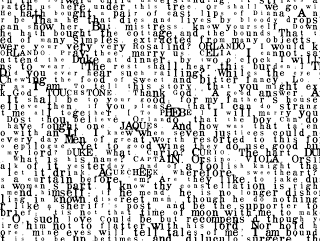At last, a new list! Tor.com, who normally specializes in the science fiction world, caught my eye with their list of Fictional Shakespeares. Wot’zat, then? Well it starts with Shakespeare in Love and I’m thinking, “Oh, ok, this is going to be a list of adaptations where Shakespeare is a character cool.” But I had no idea if it was to be movies or novels or what.
Well, all of that and more. The list contains:
- three movies (I’m counting the “miniseries” as a movie)
- three novels
- a short story
- five comics (I’m including “graphic novels” here, don’t shoot me)
- five television episodes





